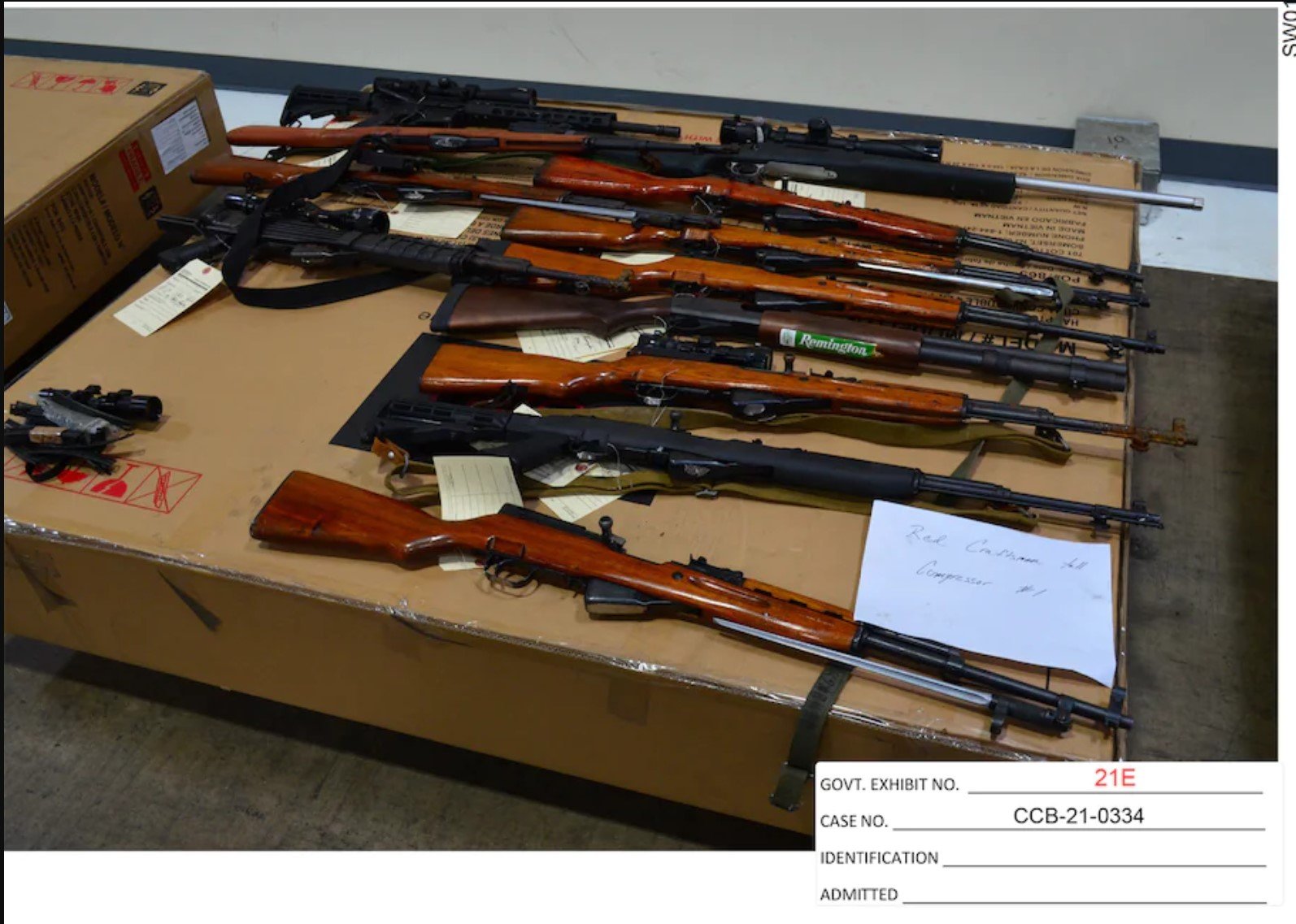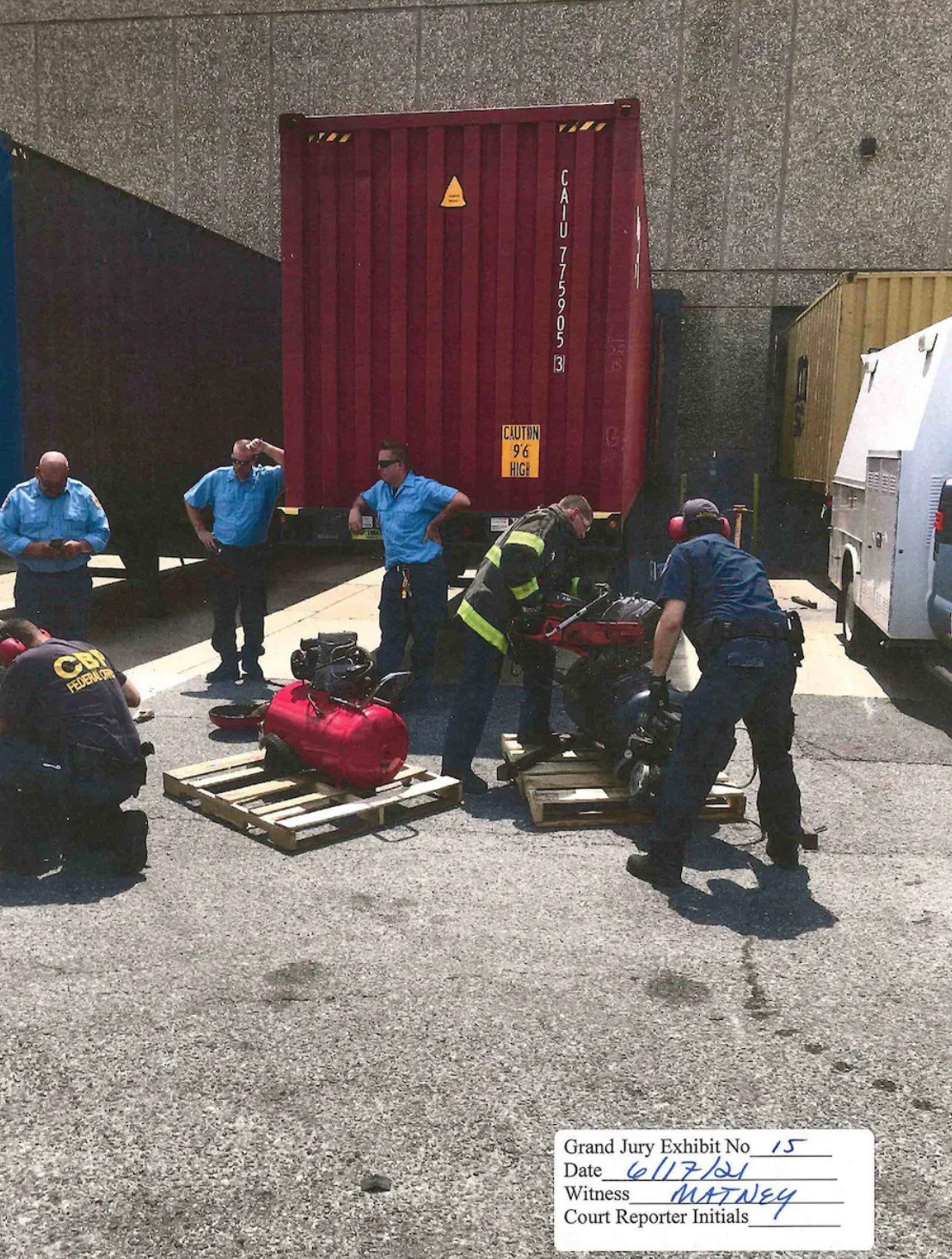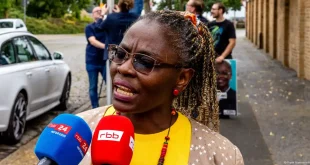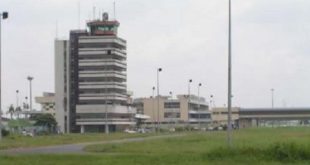Cameroonians in Maryland say they understand why.
The Washington Post | ROSEDALE, Md. — They called the cramped basement of the red brick house in the Baltimore suburbs “the lab” and agreed to leave their phones in a bucket at the door before they went in. On group chats, they went by aliases and spoke in code words about the projects they worked on inside.
Deliveries kept arriving at “the lab” in 2018 and 2019, federal agents later discovered. Thousands of rounds of ammunition. A gas mask. A ghillie suit, a full-body camouflage suit worn by hunters or military snipers. They were addressed to Tamufor St. Michael, the house’s owner. He bought 24 rifles online between 2017 and 2019, according to court records, and picked them up from a nearby gun shop.
St. Michael didn’t intend to keep the arsenal he’d amassed at his home in Baltimore County’s Rosedale community with a group of volunteers. Instead, he wrapped the guns in metal foil and hid them in the bed of a Toyota pickup truck loaded into a shipping container to Nigeria, prosecutors said, destined for the front line of a bloody civil conflict over language and identity in St. Michael’s native Cameroon.
Cameroonians in Maryland, who’ve spent years watching conflict unfold in their home country from afar, are torn as sentencing looms for St. Michael, who is out on supervised release after pleading guilty to felony charges of conspiracy and violating the Arms Export Control Act.
Some see him as a lawbreaker. Others see a patriot who went too far.
St. Michael and Robert Bonsib, the lawyer representing him, declined to comment on his case. But court records and interviews with those who knew St. Michael tell the story of a journey that took the now-42-year-old activist from a quiet arrival in the U.S. and enlistment in the U.S. Navy to the leader of a covert effort that prosecutors cast as a plot to evade American authorities and smuggle arms.
Federal investigators who testified in court about what they found described alarming volumes of weaponry and a basement of equipment resembling a full-scale manufacturing operation, capable of inflicting serious damage.
Still, “people consider him as a messiah,” said Eric Tataw, a Cameroonian activist in Lanham who runs a car rental company. “If every single other Cameroonian had the opportunity, they would send guns.”
An old conflict reaches from abroad
St. Michael arrived in the United States in 2001, according to an affidavit filed by the Bureau of Alcohol, Tobacco, Firearms and Explosives agent who investigated him, and applied for asylum the same year. He became a naturalized U.S. citizen around 10 years later and in 2009, he enlisted in the U.S. Navy, according to the Navy Office of Information, and later served as a logistics specialist at Joint Base Andrews in Prince George’s County.
In Maryland, St. Michael joined a tightknit community of Cameroonians in diaspora, connected by extended family, school alumni networks and church groups. Herbert Boh, a retired journalist from Cameroon who lives in West Virginia, said around 300 Cameroonians gather every month for Mass at the Church of Resurrection in the District, where they dance to drums, socialize and share worries about what’s happening back home.
Old colonial borders divide the central African country’s more than 27 million people by language. French speakers make up the majority of Cameroon’s population (most of the country was a former French colony) but roughly 20 percent of Cameroonians, who hail from a southwest region formerly part of a British territory, speak English.
Cameroon’s crackdown on its English-speaking minority is fueling support for a secessionist movement
The Cameroonian government, composed overwhelmingly of French-speakers, has long fielded complaints of corruption and the marginalization of English-speakers. In 2017, the tensions escalated into open violence. In recent years, an armed Anglophone separatist movement has battled the Cameroonian military in parts of the country’s English-speaking regions. Anglophones in Cameroon told The Washington Post in 2018 that the Cameroonian military has also targeted villages in English-speaking regions of the country, which the government has denied.
It’s well before dawn in Maryland when Cameroonians are starting their day. For those in the English-speaking diaspora that have friends and family back home, awakening to reports and images of attacks became a constant source of dread.
“You live here and there, kind of,” Boh said. “You’re up at night, trying to connect with people who are really stressed and worried about whether they will wake up and see tomorrow.”
Those who knew St. Michael said he shared those concerns. Nchang Nchumuluh, St. Michael’s brother who also immigrated to Maryland, told The Post that family members in Cameroon had faced attacks. Julius Tangwe, who met St. Michael in the Cameroonian capital of Yaoundé before also immigrating to Maryland, called him an energetic and “feisty” student animated by social issues in his community.
“He doesn’t like to watch things happen,” Tangwe said. “He was a stout guy that liked standing his ground.”
The Cameroonian community in Maryland and the D.C. metro region regularly organizes demonstrations and donation drives to send money, food and medical supplies home. The uptick in violence in 2017, Boh said, was a tipping point. Protesting felt hollow when people were dying.
St. Michael, who testified in the trial of Wilson Tita, Eric Nji and Wilson Fonguh, three other Cameroonians charged in the same conspiracy, said that the talk turned instead to helping people defend themselves.
“Self-defense was a topic that always came up,” St. Michael said in testimony in May 2022. “Because as communities were being killed, there was more and more conversation about providing a means for people to self-defend themselves.”
It was just talk for most. But St. Michael is a firearms enthusiast, Tangwe and Nchumuluh said, who went to firing ranges and spent long nights in his basement assembling guns. In the Navy, he worked as a logistics specialist and received an award for pistol marksmanship. In testimony, St. Michael said he studied gunsmithing at a community college in North Carolina.
“He was a military guy,” Tangwe said. “If you saw me with guns, somebody would be shocked, but he’s a military guy, so [I thought] ok, it was part of his field.”

A secret plan intercepted
In May 2017, according to federal agents, St. Michael applied for and was approved as a designated collector, a status granted by Maryland State Police that permits an individual to make multiple firearm purchases within a month (which the state of Maryland normally prohibits) “for the enhancement of the collector’s personal collection.”
Over the next two years, St. Michael purchased 24 rifles online and picked them up from a gun store in Essex, according to his plea agreement. Among them was a Noreen bolt-action rifle that fires large .50 caliber rounds — the kind used by the U.S. military for long-distance sniping and to disable vehicles. According to St. Michael’s testimony, he met regularly with several volunteers to clean and reload ammunition for their growing collection of firearms.
Toward the end of 2018, St. Michael loaded a cache of weapons and military equipment in a shipping container that left the Port of Baltimore bound for Nigeria in January 2019. It was never unloaded there. Federal agents ordered the container to be redelivered to Baltimore after flagging that it had been shipped under a false name and address. The ghillie suit still had a shipping label affixed, addressed to St. Michael’s Rosedale house. A judge quickly issued a search warrant.
Federal agents recovered over 30 rifles and handguns from the shipping container, some with obliterated serial numbers and attachments like scopes and bayonets, according to court documents. In St. Michael’s “lab,” they found a tangle of firearms, ammunition and hobbyist tools to assemble firearms and load cartridges by hand.
St. Michael was arrested in July 2019. He pleaded guilty at the end of the year. News of his case spread quickly in the Cameroonian community on group chats and social media — Tataw was “devastated,” he said, when he learned.
In 2021, a French Cameroonian news site incorrectly reported that St. Michael and his associates had been charged for arming secessionists, not smuggling. Prosecutors did not specify to whom the guns were being sent. In testimony, St. Michael said he was approached by the Ambazonia Defence Forces, an armed Cameroonian secessionist group, but declined to sell or transfer weapons to them. He wanted instead, he said, to give them to “responsible” individuals to protect their communities.
A sentencing date has not yet been scheduled for St. Michael. Violating the Arms Export Control Act, which prohibits the export of various categories of firearms and ammunition without a license, is a felony that carries a maximum sentence of 20 years in prison and fines of up to $1 million.
As he awaits his punishment, conflict simmers in Cameroon. Threats of attacks from separatist groups in January loomed over the Africa Cup of Nations as Cameroon hosted the continent’s soccer tournament. Gunmen torched a church and kidnapped five Catholic priests in southwest Cameroon in September, which separatists disavowed as the actions of a splinter group.
Reports of violence still stir those in the diaspora to action, Boh said, though they fear they’ve been overlooked as newer conflicts command the world’s attention. Watching from afar, they wait and worry, wondering how best to help.

 CameroonOnline.org Cameroon news, Actualité Camerounaise, live Web TV & Radio, World News and a lot more
CameroonOnline.org Cameroon news, Actualité Camerounaise, live Web TV & Radio, World News and a lot more





Show me just one industrial city in Cameroon employing just two million people and I will take the diaspora serious. Ontill then, they are ignorant clowns.
Show me just one industrial city in Cameroon build by the diaspora employing just two million people and I will take the diaspora serious. Ontill then, they are ignorant clowns.
Eric Tataw, Di Pimento etc…your time is coming. You don’t have the balls to go fight but keep running your mouth. Neo-colo mentality go kill wuna and wuna cousin Biya. Kikikikikiki
kikikikikikikiki ??????????
Where are they to help us defeat so called la republic? ignorant as they are they do not know what war is about. not a surprise for people who believe in wereh neng( jesus) kikikikikikikiki
the cruelest of deceptions…wereh neng will not save them
This man was fraustrated at watching his vulnerable people killed on a daily bais by french cameroon military in the last over 5 years. He should have done some investigation onhis work transaction in a third world country because no one can live in a democratic,developed country and send arms, weapons, illegal objects abroad by any means because all their airports, sea ports, land routes etc have sophisticated detectors without corrupt workers.
Frustration? where was rationality?
His name is St. Michael, a disciple of wereh neng. No rationality there. Kikikikikikiki